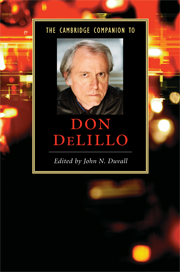Book contents
- Frontmatter
- Introduction: The power of history and the persistence of mystery
- PART I AESTHETIC AND CULTURAL INFLUENCES
- PART II EARLY FICTION
- 3 DeLillo and media culture
- 4 DeLillo’s apocalyptic satires
- 5 DeLillo and the political thriller
- PART III MAJOR NOVELS
- PART IV THEMES AND ISSUES
- Conclusion: Writing amid the ruins: 9/11 and Cosmopolis
- Select bibliography
- Guide to further reading
- Index
- Series List
5 - DeLillo and the political thriller
from PART II - EARLY FICTION
Published online by Cambridge University Press: 28 June 2008
- Frontmatter
- Introduction: The power of history and the persistence of mystery
- PART I AESTHETIC AND CULTURAL INFLUENCES
- PART II EARLY FICTION
- 3 DeLillo and media culture
- 4 DeLillo’s apocalyptic satires
- 5 DeLillo and the political thriller
- PART III MAJOR NOVELS
- PART IV THEMES AND ISSUES
- Conclusion: Writing amid the ruins: 9/11 and Cosmopolis
- Select bibliography
- Guide to further reading
- Index
- Series List
Summary
Despite consistently laudatory reviews, DeLillo's early fiction did not have the popular success that his work since White Noise (1985) has achieved. One reason why fewer readers appreciated DeLillo's early work is that it consistently thwarts readers' expectations. It does not do so gratuitously or perversely but rather as a reflection of a profoundly altered cultural landscape, a world for which he considers conventional storytelling frameworks inadequate. As DeLillo once wrote, “For me, well-behaved books with neat plots and worked-out endings seem somewhat quaint in the face of the largely incoherent reality of modern life.” Nevertheless, DeLillo often deploys familiar devices and conventions, both literary and cinematic. In two novels published just a year apart, Players (1977) and Running Dog (1978), he borrows heavily from a longstanding genre of popular literature and movies, the political thriller, only to rearrange and subvert the genre's conventions at every turn.
Popular since the 1950s, the political thriller has become a familiar vehicle for entertainment, thanks in large part to such bestselling novelists as Robert Ludlum, John le Carré, and Tom Clancy and to such audiovisual spectacles as the numerous James Bond films and the Mission: Impossible television and film series. The political thriller emerged primarily in response to the post- World War II establishment of such national intelligence organizations as the American CIA and the British MI5. In these narratives primarily white male protagonists battle threats to the national and global order against a backdrop of governmental operatives, elusive saboteurs, and alluring women, who typically function as distractions for the protagonists from their otherwise single-minded efforts.
- Type
- Chapter
- Information
- The Cambridge Companion to Don DeLillo , pp. 66 - 76Publisher: Cambridge University PressPrint publication year: 2008
- 4
- Cited by

